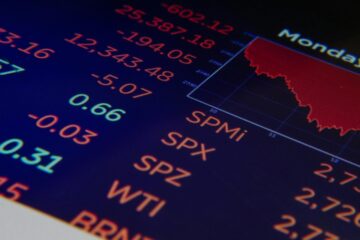United States
The S&P 500 closed at $2,362.72, up 1.44% when compared with the beginning of the week, where opened at $2,329.11 following concerns about President Trump’s ability to secure the passage of the tax reform after failure of his healthcare reform. The other major U.S. equity indices, the Dow Jones Industrial Average and NASDAQ, followed parallel paths closing the week respectively at $20,633.22 and at $5,911.74. In general, U.S. equity indices recouped the sharp losses of the previous week but were characterized by volatile sessions and ended the week in a wait-and-see mood.
Last week important data about U.S. economy showed an improving in fundamentals. On Tuesday the Consumer Confidence Index jumped at a 16-year high of 125.6, an 8.18% increase from the previous value of 116.1. This increase has been driven by both the current situation of U.S. economy and the expectations of future improvements. Moreover, news about an upward revision from 1.9% to 2.1% of the U.S. fourth quarter G.D.P. were released on Thursday.
Encouraged by these positive data, Regional Federal Reserve Officials commented in support of multiple rate rises this year. At the mid-March policy meeting of the U.S. central bank the median expectation was for 2 more hikes during this year; however after the last economic data and the catch up of inflation with its target (measured with the US core personal consumption expenditure inflation rate), it seems like the possibility of 3 hikes instead of 2 is not out of discussion.
Regarding the Forex, Euro traded as high as $1.0904 at the beginning of the week but on Wednesday ECB sources stated that markets misinterpreted Mario Draghi’s speech and that further changes in the monetary policy would be problematic, especially for non-core countries. As a consequence, the euro/dollar reacted dropping from $1.0780 to $1.0745. The EUR/USD closed the week at $1.0652 down 1.95% when compared with the Monday closing value. In terms of other currencies, the Dollar Index Spot opened the week at a 3 month low of 99.166 and closed slightly up on Friday at 100.350.
Finally yet importantly, gold opened the week up $10 on Monday trades at $1,254, mirroring the uncertainty about U.S. politics. During the week the precious metal moved up and down around $1,250, value at which ended the trades on Friday, up $6 on the opening of Monday.
Next week other important data will be released; on Monday the ISM manufacturing PMI and on Friday the Unemployment rate. However, the core event that may have a huge impact on the market will be the meeting between President Trump and President Xi Jinping that will take place on April 6th and 7th in Florida and that may be will brought clarification about the trade relationship that U.S. President wants to have with China.
Eurozone
European stock markets closed the week on a positive note. The DAX closed at 12 312.87, the highest level since April 2015. The FTSE MIB closed at 20492.94 (+1.54% from previous week), the CAC 40 closed at 5122.51 (+1.99%) while the EUROSTOXX 50 closed at 3495.59 (+1.42%)
The Euro saw an appreciation (+0.83%) with respect to the Dollar in the first part of the week reaching a week-high of 1.0894 but depreciated down to 1.0686 on Friday. Following the lasting EU ban on hormone-pumped American beef, the US administration is now considering to add tariffs as high as 100% on some European goods, such as Vespa scooters, Perrier water and Roquefort cheese.
Germany unemployment rate was released on Friday, at 5.8% it is the lowest since the 1991 reunification. Inflation rates in Italy and France were also released on Friday, with the Italian HICP down at 1.3% YoY (previous 1.6%) and the French one stable at 1.4%.
On Wednesday, Britain formally triggered article 50 of the treaty of Lisbon, with no particular reaction from the market. One of the top priorities will be settling the 60 billion-euro of UK’s outstanding obligations and negotiate a new trade deal.
With regard to the fixed income market, the German 10y Bund closed at 0.328 (0.403 last week) with the Italian respective at 2.318 (previously 2.224) and the French one at 0.970 (previously 0.985). The Greek 10y fell to 6.986 from 7.410 last week.
Next week’s main announcements will be on Monday the unemployment Rate for Italy and the Euro Area (forecast: 11.8% and 9.5% respectively) and on Friday the Balance of Trade for Germany and France.
UK
This week’s developments in the British stock market were defined by the official Brexit announcement on Wednesday. The FTSE 100 started the week lower at 7293.5 but gained to a 7381.25 weekly high on Thursday as investors’ fears over a hard Brexit scenario were hurting the British currency. The GBPUSD initially fell to 1.2434, but closed the week at 1.2543, virtually unchanged from last week, after PM Theresa May and President of the EC Donald Tusk signaled constructive optimism over future negotiations.
The pound’s recovery in the final two days of the week marked its first QoQ gain against the dollar since Q2 of 2015 and caused the FTSE to lose some of its earlier gains, closing at 7322.92 on Friday, little change from 7336.82 last week. The resilience of the pound surprised some investors who had priced in a harsher Brexit environment. GBPEUR rose 1.6% over the week to 1.1778.
The real estate sector remains unperturbed by Brexit. In fact, real estate investors Land Securities Group (+2.79%) and British Land Co. (+2.02%) were among the best performers in the FTSE this week, with Land Securities CFO Martin Greenslade signaling confidence by purchasing 6000 shares on his own for a total of £62,520.
The UK’s 10 year gilt opened at 1.167 and closed at a monthly low of 1.139 (-3.5% since last week) as UK bond funds attracted $380 million over the week.
In its monthly commentary for March, the Office for National Statistics points to strong consumer spending, increasing by 2.9% in Q4 of 2016. Next week’s anticipated releases are on production and construction data for February.
Inflation for February was reported at 2.3%, beating 2% expectations, and a recent business and consumer survey by the European Commission shows that British food and beverage retailers expect store prices to increase further. The BoE may have to interfere soon to contain inflation.
Rest of the World
In Japan, benchmark Topix fell by 1 percent on Friday halting rising optimism amongst exporters due to 0.8 percent drop in the yen on Thursday. Toshiba, the 142-year old conglomerate and one of the Japan’s largest listed companies, filed for Chapter 11 bankruptcy for its US based power subsidiary, Westinghouse. The ¥700bn (some $6.3bn) write-down raises questions about Japan’s ailing nuclear power industry and its sustainability.
China launched its first exchange traded commodity options product by launching options on Soymeal in the commodity exchange in the city of Dalian. There is also a plan to launch futures on sugar in order to help firms and industry to cope with complex agricultural products. The Shanghai Composite gained 0.4 per cent at the end of the week and a survey showed that manufacturing sector in China climbed to its highest since 2012. Investors await for the outcome of the first meeting between Xi Jinping and Donald Trump on April 6th and 7th.
India remains an attraction for foreign investors amidst hopes for reforms in legal and working environments. Prime Minister Narendra Modi’s party’s win in state elections boosted a fresh wave of optimism with foreign holdings of rupee-denominated government and corporate bonds climbing by 359.4 billion rupees ($5.5 billion) in the quarter, and March counting for 272 billion rupees alone. The Indian Rupee held its position as the best currency performer in Asia this month having gained 4.7 percent since Dec. 31.
Political uncertainty still clouds South Korea after the arrest of impeached president Ms Park. The political scandal has engulfed Lee Jae-yong, vice-chairman of Samsung who sits accused for offering a bribe of 43bn won ($38m) to Ms Park and Ms Choi in exchange for state favors. Elections for the post are scheduled for May 9th, 2017.
In South Africa, President Zuma announced the reshuffling of 20 members of the cabinet including the finance minister, Pravin Gordhan, and his deputy, Mcebisi Jonas. Markets reacted immediately pushing the Rand down 7% against the dollar this week. Yields on country’s 10 year government bonds have increased by 34 basis points to 8.85% since the announcements and investors speculate that the country’s credit rating will be degraded to junk status in the announcement by rating agency Moody’s on April 7th.
Saudi Arabia has appointed JPMorgan, Morgan Stanley and HSBC as financial advisers for the upcoming listing of Saudi Aramco. The country has also said it will cut the tax rate for large oil producers, including Saudi Aramco, from 85 per cent to 50 per cent. The listing is to value the company at $2 trillion. Brent Crude, the international benchmark was down 0.4 per cent on Friday at $52.76 a barrel, while West Texas Intermediate, the main US contract, was off 0.4 per cent at $50.13.



0 Comments